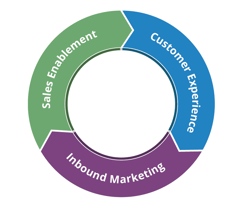Account-based marketing (ABM), also known as key account marketing, is a strategic approach to B2B marketing based on goals for specific target accounts. ABM helps organizations communicate with individual prospects or accounts as markets of one. You can think of ABM as a one-to-one approach instead of a one-to-many approach. Account-based marketing is typically used in enterprise-level brands with more than 1,000 employees to help teams with the following:
- Engage earlier in the sales process and with higher value opportunities.
- Align strategic marketing initiatives with sales and account management strategies.
- Maximize the value and return on investment (ROI) from marketing campaigns.
You've probably been incorporating elements of account-based marketing into your B2B marketing strategy already. However, it now has a new level of importance, and you should consider integration into your marketing plan. At some point in time, your marketing campaign probably appealed to the masses, but now we know the value of inbound marketing, which draws targeted prospects to your business with incredibly relevant content. As you’re applying inbound marketing into your strategy, you’ve likely realized that individuals respond to different pieces of content and assets depending on their buyer persona and where they are in their decision-making journey.
Account-based marketing raises the stakes by targeting one company (or one account) and further targets the decision-makers within this account with coordinated and high-touch sales and marketing tactics. In this way, ABM takes mass marketing and targets it to a market of one for that specific message.
Don’t worry, though – this approach can still be automated if you have both the appropriate data on these individuals and ways to collectively communicate that data between sales and marketing. However, the approach to engage with the right individuals at these accounts is different than your traditional mass marketing tactics.
Account-based marketing focuses on a few large and important accounts or those potential accounts that hold the greatest promise of adding to your bottom line. That’s why it’s so critical to have a high-touch and highly targeted message to these individuals because of their revenue potential and impact on sales and marketing.
Here are five reasons to start implementing ABM:
- Personalized communications. Personalized marketing strategies are proven to engage prospects and customers. For example, with email introductions, everyone prefers to be addressed by name rather than by a generic and slightly off-putting “Dear potential customer.” Account-based marketing takes personalized marketing to a new level by developing content those key decision-makers want and need to move them through the buyer’s journey. Such finely-tuned content requires research, which the key decision-makers should instantly recognize. It also requires marketing and sales to collaborate to efficiently and effectively target these contacts in a way that is going to be most meaningful to them.
- Efficient use of marketing resources. Marketing is consistently pulled in many different directions. ABM helps to structure your marketing efforts and resources on your key accounts to drive the most revenue. With such a narrow focus, it is understood that account-based marketing initiatives optimize your most valuable resources: staff time and money. By integrating your sales and marketing efforts, you can focus your marketing team to work directly with sales to target and develop content for these key accounts. That will not only maximize the efficiency of your B2B marketing resources, but it will also help build the communication channel with sales to have an aligned sales and marketing organization.
- Defined return on investment. A marketing strategy must be measurable. This is no different with ABM. According to the Information Technology Services Marketing Association, 84% of businesses surveyed said that account-based marketing delivers higher ROI than other types of marketing. Measuring the ROI of any marketing initiative is critical and is possible with the many automation and software tools available. Through ABM, you can see both the return on investment for an ABM initiative and immediate areas for improvement based on how contacts are responding to your content.
- Enhanced tracking. While reviewing your bottom line, ROI is critical. But it’s also critical to report on the tactics that either contribute or don’t contribute to that ROI. You must review the effectiveness of each tactic, whether it's an email campaign, special event, or webinar. By knowing the effectiveness of each individual component of your ABM strategy, you will be able to build more effective campaigns moving forward. As noted in the ABM Adoption Report, “ABM’s ability to drive revenue creates benefits for the marketing organization. The ultimate goal for a marketing organization is to not just influence revenue, but to attribute a measurable contribution to revenue.” In addition, with the software platforms available now, tracking is almost real-time so you can make changes to your campaign on an ongoing basis. Tracking these metrics daily will save you time and budget.
- Closer alignment of sales and marketing. How many times have you seen sales and marketing teams function in individual silos? That must change, especially if you are going to implement a true ABM strategy. It requires that sales and marketing teams work closely together to identify target accounts, develop a communication strategy and outreach tactics, and monitor the campaign's progress. A survey from Bizible found that “marketers doing ABM are about 40% more likely to report alignment with their sales team compared to marketers not doing ABM.” In this way, ABM serves to unite teams, not to divide teams. ABM keeps these teams working together instead of working independently.
ABM is a proven way for B2B marketers to align more strategically with sales and build personalized campaigns targeted toward specific accounts to drive revenue. ABM is not intended to replace mass marketing initiatives that are geared toward driving awareness and traffic. But ABM is the next level of B2B marketing to help drive organizations toward clear ROI and measurable sales results based on marketing campaigns and integration with sales efforts.
Are you looking to build or enhance your account-based marketing strategy? Schedule your ABM strategy discussion with a member of our team today to see how you can leverage ABM in your B2B marketing efforts.







.png?width=250&name=diamond-badge-color%20(1).png)
